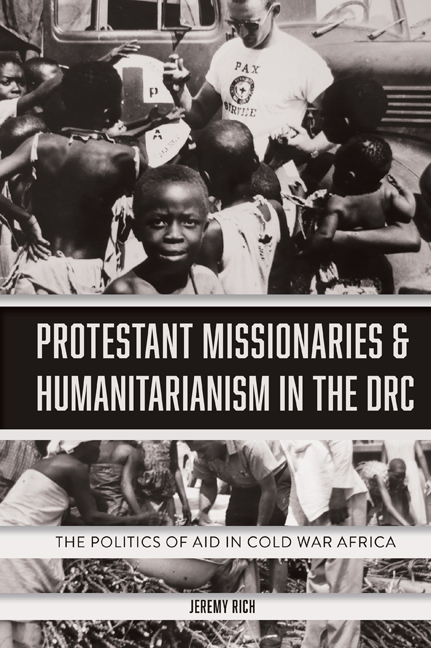Book contents
- Frontmatter
- Contents
- List of Illustrations
- Acknowledgements
- List of Abbreviations
- Introduction
- 1 The CPRA, Protestant Missions, and the Congo Crises, 1960–1965
- 2 The CPRA and Luba Refugees in South Kasai, 1960–1962
- 3 The CPRA and Angolan Refugees in the DRC, 1961–1967
- 4 The CPRA and the Simba Revolts, 1964–1967
- 5 Operation Doctor: The Rise and Fall of a Protestant Short-Term Medical Volunteer Programme
- 6 Protestant Volunteers and Medical Practice in the Congo in the 1960s
- 7 Changing Dollars into Zaires: The Challenges of a Humanitarian Aid NGO in the DRC, 1965–1973
- 8 The Centre for Community Development
- Conclusion
- Bibliography
- Index
- Frontmatter
- Contents
- List of Illustrations
- Acknowledgements
- List of Abbreviations
- Introduction
- 1 The CPRA, Protestant Missions, and the Congo Crises, 1960–1965
- 2 The CPRA and Luba Refugees in South Kasai, 1960–1962
- 3 The CPRA and Angolan Refugees in the DRC, 1961–1967
- 4 The CPRA and the Simba Revolts, 1964–1967
- 5 Operation Doctor: The Rise and Fall of a Protestant Short-Term Medical Volunteer Programme
- 6 Protestant Volunteers and Medical Practice in the Congo in the 1960s
- 7 Changing Dollars into Zaires: The Challenges of a Humanitarian Aid NGO in the DRC, 1965–1973
- 8 The Centre for Community Development
- Conclusion
- Bibliography
- Index
Summary
This book has offered an alternative approach to the current historiography of the Congo crises. For all of the strengths of the scholarship on the battles for political power in the DRC in the first decade of independence, this state-centred approach has obscured a great deal. Perhaps the greatest lacuna in the literature is how civilians outside of the elite experienced (and sometimes participated in) the violent contests for power in the 1960s. Although CPRA records only offer a limited glimpse into the varied ways Congolese negotiated their survival in this difficult terrain, they do indicate the magnitude of suffering people endured. Hundreds of thousands of Angolans resettled in the DRC and large numbers of Congolese fled their homes. Yet these massive displacements have yet to be seriously examined, outside of exceptions such as this study or the growing scholarship on ethnic identity and politics in the Great Lakes region. Undoubtedly, memories of the 1960s have continued to inform later political struggles. For example, the current Kamina Nsapu revolt in Kasasi province has historical roots in the Lulua/Luba conflict of the 1960s. Though CPRA records often muffled the concerns of Congolese partners, their records do provide sources that can further contribute to understanding the choices of Angolan and Congolese people in this turbulent era.
I deliberately chose not to write a book that placed US foreign policy in the foreground. There is no doubt the CPRA must have indirectly assisted the goal of US officials in establishing a reliable, anti-Communist ally in Kinshasa by furnishing aid. This corresponds to the larger development of US humanitarian NGOs in the 1950s and early 1960s. Yet it is impossible to quantify how effective CPRA's work was in ensuring the victory of Congolese clients of the US government. Rather than try to take on the fruitless task of calculating how successfully the CPRA served the State Department, it seemed to me better to consider the evolution of the CPRA as a humanitarian NGO that tied together Western Protestant churches and donors with Congolese stakeholders. These Christian transnational relationships were not just the products of colonial expansion and the Cold War, but had their own dynamics which were not defined only by state policies.
- Type
- Chapter
- Information
- Protestant Missionaries and Humanitarianism in the DRCThe Politics of Aid in Cold War Africa, pp. 228 - 234Publisher: Boydell & BrewerPrint publication year: 2020



